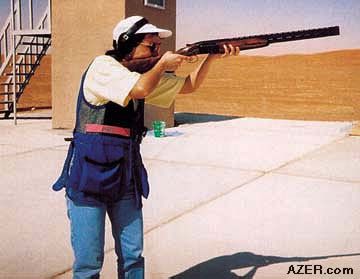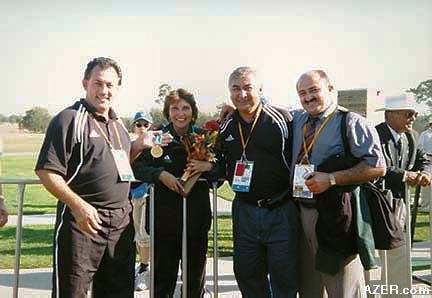|

Winter 2000 (8.4)
Pages
79
Right on Target
Olympic
Gold - Skeet Shooter
Zemfira Meftakhetdinova

Azerbaijani
skeet shooter Zemfira Meftakhetdinova (1963- ) brought
home the Gold from this year's Olympics in Sydney. She also holds
the Olympic record, since this is the first year that Women's
Skeet was held as a separate event. This latest prize tops her
accolades as winner of the European Championship, European Cup,
World Championship and World Cup. Despite her extraordinary record,
when it came to Sydney, she admits, "I was afraid even to
dream of victory."
Zemfira's achievement is even more remarkable considering that
she can't even train for her sport in Azerbaijan. "Other
shooters don't believe me when I tell them I don't train,"
she says, "but it's true. The one shooting range in Baku
was closed down in 1990 when martial law was imposed in Azerbaijan.
It never reopened, and now refugees occupy its administrative
building."
Back then, Zemfira used to train four times a week, for three
to four hours a day. Now she and her trainer, Hafiz Jafarov,
only get to train in Istanbul or Dubai once or twice a year and
then only for a few weeks. Azerbaijan's Youth and Sports Ministry
sponsors the trips. For the Olympics, Zemfira and her trainer
flew to Australia nearly three weeks early so that they could
train before the competition.
At home, Zemfira makes the best of a difficult situation, cross-training
in various activities to build her endurance. Three or four times
a week, she runs, swims and lifts weights to stay in shape.
Skeet Basics
Skeet shooting requires quick reflexes and a steady aim. Unlike
trap shooters, skeet shooters are not allowed to raise their
guns until the clay target appears. The shooters stand in various
stations on a semicircle that faces two trap houses; the distance
away from the target, therefore, depends on where the shooter
is standing on the semicircle. Targets fly out of the trap houses,
one at a time, a total of 25 in each series. In the Olympic women's
event, the preliminary round features three series, each lasting
about 30 minutes. A final round of 25 targets follows.

Above: Zemfira Meftakhetdinova with her coach
and Azerbaijani trainers after winning the Gold for Women's Skeet
Shooting in Sydney.
Trap shooting, another Olympic event, is slightly different from
skeet. The targets don't fly out of trap houses; they fly out
from a trench - left, right or upward. In double trap, two targets
fly out at once.
Zemfira first took an interest in skeet shooting at age 13. At
the time, her family lived in the 8th Micro district in Baku,
close to the shooting ground that belonged to the Sports Committee.
"We used to hear shots every day. It fascinated the kids
who grew up together there in our courtyard." One day, Zemfira
and some of her girlfriends decided to go and take a look at
what was going on. She's been hooked ever since. That was the
beginning of the long, hard journey that led to the Olympics.
Jafarov, who was named Honored Trainer of the USSR, is the only
coach Zemfira has ever had since she began in 1976. "He's
not just a teacher," she says, "he's like a father
to me. When I've failed and started to cry, he has always calmed
me and explained what I did wrong. To tell you the truth, I think
I'm the one most responsible for his gray hair."
In 1979, Jafarov gave Zemfira her first gun, one that was made
in Tula, Russia. She used this treasured gun up until last year,
when she switched to the Italian "Perazzi" that she
used at the Olympics.
A Shot at Victory
Although Zemfira can boast of world renown in her field, she
also knows what crushing defeat is all about. "My greatest
disappointment," she confides, "was at the 1998 World
Cup in Cairo. In the main program I set a world record, hitting
74 targets out of 75. Everybody congratulated me. But in the
final round, I missed seven out of 25 targets only to take fourth
place. It was terrible. Six months later I still hadn't recovered.
I used to wake up in the middle of the night wondering: 'How
could I have done that?'"
At the Olympics this year, she had a chance to prove herself
again. "It seemed just like a regular competition,"
she says, "but I felt more excited because this was my first
time to compete in the Olympics. Of course, deep, deep down in
my heart, I hoped that I would win, but I was never sure about
my victory."
Her competition was tough. According to Zemfira, the final series
was especially grueling: "When you know that you're in the
lead, it lies heavy on you. However, I didn't feel alone. My
trainer supported me the whole time."
Zemfira says she tries to minimize the pressure by focusing on
the task at hand: "When I'm competing, my coach and I are
concentrating on doing a good job, not on the outcome. We think
about each shot and how to make it successful."
Olympic Gold
Their strategy worked. In the preliminaries, Zemfira scored 73
points out of 75. In the final round-the one that seemed the
most stressful - she received a perfect score: 25 out of 25,
for a total of 98 points.
Russian shooter Svetlana Demina followed with 95 points to take
the Silver; Hungarian shooter Diana Igaly won the Bronze with
93.
What advice does Zemfira have for those who want to compete in
the Olympics? "Patience, hard work and persistence. The
main thing is hard work. As they say, 'No pain, no gain.' I always
believe that willpower is the most important characteristic.
If you make up your mind to reach a goal and are surrounded by
people you trust, you can achieve anything."
Having an occupation that supports your goals helps, too. Zemfira
has been on the police force in Baku since 1994. Each time after
a major victory, Zemfira returns home to discover that she has
been promoted to a new rank. First there was Lieutenant, then
Senior Lieutenant, Captain and now Major. "I hope this won't
be the last rank that I achieve," she admits.
But in addition to the fame from the Games, her Gold medal has
brought more. On October 18, President Aliyev honored the Olympic
winners for their victories; Zemfira and her coach, Jafarov,
were among those given Azerbaijan's highest civic award, the
"Shohrat" (Fame) Order.
As for the Gold, it translated into $100,000 waiting for her
back home - $50,000 from President Aliyev and $50,000 from the
Azerbaijan National Olympic Committee. Her coach was awarded
for his invaluable contribution as well and received $50,000.
"I've never had so such money in my life," Zemfira
says, "and I don't know if I'll ever see so much money again.
Like everyone here in Azerbaijan, I have financial problems -
but I plan to spend this money on my 10-year-old daughter's education.
I want her to become an intelligent person with a good solid
education and an interesting life. No matter what profession
she chooses, more than anything, I want her to be a decent person.
I don't mind if she goes in for sports, but I don't want sports
to be her profession because it's so short-term. Today, you're
at the height of fame, but tomorrow, you may be forgotten."
Zemfira Meftakhetdinova was interviewed by AI Staff Member Arzu Aghayeva.
_____
From Azerbaijan
International
(8.4) Winter 2000.
© Azerbaijan International 2000. All rights reserved.
Back to Index
AI 8.4 (Winter 2000)
AI Home
| Magazine Choice | Topics
| Store
| Contact
us
|